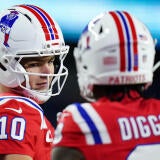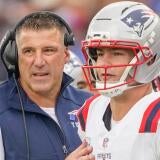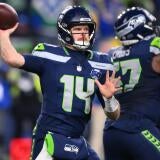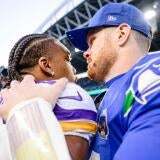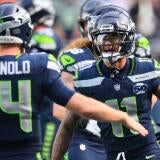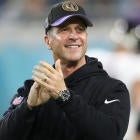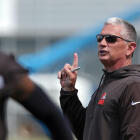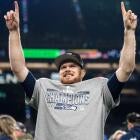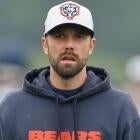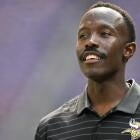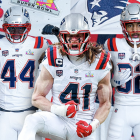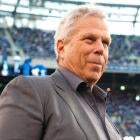2024 NFL head coach search: Why aren't more teams trying to find the next John Harbaugh?
Special teams coordinators are being overlooked for head coaching jobs

Eight head coach openings and one filled so far. Names of potential candidates are flying, with a new name for a new spot hitting nearly every hour: offensive coordinators and defensive coordinators, linebacker coaches, interim head coaches, former head coaches.
And exactly one special teams coordinator: Chris Tabor. (Who, to be fair, was also an interim head coach.)
"Do you think I have an opinion on this?" Bill Cowher says, with a laugh that comes right down the telephone line. Because oh yes, does the Super Bowl-winning Hall of Fame coach -- who started his career as a special teams coach -- have an opinion. One just as strong as every other person who's ever filled the role. Essentially: Having been a special teams coordinator actually offers the single best training to run an entire team.
Bill Belichick logged time as a special teams coordinator. So did Marv Levy. Dick Vermeil, Dennis Green and John Harbaugh too. Harbaugh, as in the Super Bowl-winning coach of this year's top seed in the AFC.
"It's disappointing. It's discouraging," Harbaugh said of the various perceptions of special teams coordinators. "It's not like we're Ted Lasso coaching a different sport. You're talking about building a team."
And building -- and coaching and managing -- teams is just what special teams coordinators do. Kickoff and kick return, punt and punt return, field goal and field goal block and fake field goal and on and on. Nearly every player on the roster has -- or has to know -- a special teams role. Star defensive ends are on the field goal block unit. Starting offensive linemen are on the field goal team. Superstar wide receivers are on the hands team. In the mid-2000s, Belichick regularly used starters for basic special teams roles. Veterans like Tedy Bruschi and Rodney Harrison sent the message that fourth down was just as meaningful as downs one through three.
Sure, starting quarterbacks aren't regularly in special teams meetings. But just about everyone else is. That's why most clubs have their special teams meeting either right before or right after the team meeting; remember Hard Knocks with the Lions?
Saints special teams coordinator Darren Rizzi has interviewed for both the Dolphins and Saints head coaching jobs, ultimately losing out to Brian Flores and Dennis Allen. He has heard the knock, that special teams coordinators don't have extensive experience working with a quarterback and his response is that he actually does, because he's the one communicating situational needs, like what yard line, what hash and what clock are needed, in a key moment.
But even that, the idea of having previously coached a quarterback at any high level, Cowher said, is absurd as a prerequisite to being a head coach.
"Look at Belichick and (Tom) Brady. (Tony) Dungy and (Peyton) Manning. Myself with Ben (Roethlisberger) and then Mike (Tomlin) with Ben," he said. "None of us were offensive coaches. Quarterbacks want a head coach who has a vision."
Harbaugh takes it even one step further, saying, "Ask the counter question: Have the quarterback coaches previously had a relationship with the cornerbacks, or the defensive linemen?"
Specials teams coordinators are masters at situational football and are almost always their team's rules expert. When Rizzi was the Dolphins special teams coordinator, for three years he was the one who carried the red challenge flag -- not then-head coach Adam Gase.
They understand roster management, are constantly evaluating players' assets and occasionally being creative with how they deploy players' skills, because they have to fill out their special teams with whoever is available -- and healthy -- on the roster. Special teams coordinators are regularly asked to adjust and adapt in a way that goes well beyond replacing the starting right guard with his backup; when the Saints' Isaac Yiadom was lost to a concussion in Week 18, Rizzi had to replace him on five different units -- with five different players, and then indirectly a sixth, when one of the replacements had to be himself replaced.
Ultimately, that flexibility speaks to what should be one of the biggest enticements to owners: special teams coordinators are never slave to a scheme. It's about players, not plays. In 2012, when Harbaugh sensed Joe Flacco and his offense would respond better to Jim Caldwell than Cam Cameron, he made a change -- and won the Super Bowl. When he felt Greg Roman could pull the most out of the unlike-anyone-else Lamar Jackson, he elevated him over Marty Mornhinweg. When Harbaugh wanted his offense to take yet another step this offseason, he looked at his quarterback, recognized he wasn't a system quarterback and instead of chasing one of the disciples of the now-ubiquitous and all-the-rage Mike Shanahan tree, he hired Todd Monken, a coordinator who can and has run multiple offenses.
"All these owners hiring systems, what happens when the players don't fit the system?" Tabor asked. His own father was an extremely successful high school coach in Missouri for 40 years and he, Tabor says, "had to change his scheme every year. And he kept winning."
It's a point Tabor made in his interview with the Panthers last week, and one Harbaugh said he'd certainly make if an owner ever called him about how his nine years as the Eagles' head of special teams equipped him even more to be a head coach than his years as a defensive backs coach.
Harbaugh hears the talk of certain owners fearing if they hire someone who isn't a playcaller, then the playcaller will be plucked by another team. He himself currently has his offensive and defensive coordinators and his assistant head coach all interviewing for top jobs, but there is no panic when Harbaugh talks about it, because, he said, "It's not a pie where there's only so many guys who can do the job. You keep filling the cup and the cup keeps overflowing. It's about finding and developing coaches who can rise when they're needed."
"When you talk about ensuring you have a pipeline, whether it's with players or coaches, now you're speaking our language," Tabor said.
Which comes to the last point, the cliched trope about "winning" a press conference. Special teams coordinators are by rule some of any staff's best communicators, and always high-energy people. When the Browns brought in Bubba Ventrone this season to lead their special teams, yes, his history as a special teams ace during his own playing days in Cleveland helped, but general manager Andrew Berry also talked about the 40-year old's dynamism, and how that could help ignite and engage young players on the import of these roles. Heck, just witness Steelers special teams coordinator Danny Smith (whose rotator cuff became collateral damage during a sideline player fracas this year) chew gum: he generates electricity with every chomp.
Rizzi scoffed at the idea of a low-wattage special teams coordinator, saying, "Every time we do something, we're coaching 22 guys and covering the entire field." Then, the one-time tights end coach chuckled and said, "This isn't like when I had tight ends and had three guys over on one side."
Headlines and juice and fan enthusiasm of course matter. But head coaching in the end is about motivating players, not columnists. When Rizzi interviewed for the job in Miami he said he went back and searched for all the local writers' takes on Harbaugh's hiring in Baltimore. Most all of it, he said, was tepid.
Sixteen seasons later, Harbaugh is still leading the Ravens. He has won a Super Bowl and been Coach of the Year. He has the second-most playoff appearances of any coach since 2008, the third-most playoff wins since then (behind only New England and Kansas City) and the most playoff road wins ever, with eight. He has logged 12 winning seasons (plus two 8-8 ones) and is currently leading the AFC's favorite to reach the Super Bowl.
And yet, outside of Joe Judge and the Giants, not one other special teams coordinator has been tabbed to follow in Harbaugh's footsteps. Before Tabor this year, Rich Bisaccia in 2021 had to clean up a midseason mess. He led the Raiders to a 7-5 record and a playoff berth, he helped his players weather the emotional upheaval of Jon Gruden's dismissal and Henry Ruggs' arrest after a fatal DUI crash, and his players lobbied hard for the special teams coordinator to be retained as the head coach permanently. Alas, Mark Davis chose longtime offensive coordinator Josh McDaniels (and eight games into McDaniels' second season, fired him).
Harbaugh wants to make clear: There are offensive coaches who command rooms and defensive coaches who are monster motivators. Asking NFL owners to also consider special teams coaches is to remove what Cowher calls "the stigma" from a role that doesn't deserve one.
"Bill Belichick, Andy Reid, Mike Tomlin, they're all unicorns," Harbaugh said. "Every successful head coach is the unicorn in some way. So if you're looking for the next unicorn, you can't just look where the horses are. You have to look at different places."
And one of those places? The special teams meeting room.


